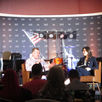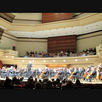DuPage Symphony Orchestra presents Darkness & Light
- Oct 13, 2021
- 3 min read

Photo: DuPage Symphony Orchestra; courtesy of DuPage Symphony Orchestra
“It is the artists of the world, the feelers and the thinkers who will ultimately save us; who can articulate, educate, defy, insist, sing and shout the big dreams,“ said American conductor and composer Leonard Bernstein. The DuPage Symphony Orchestra musicians are happy to take their audience away from a world full of worries and bring it to a world of music full of beautiful and healing sounds. A concert called Darkness & Light will open the orchestra’s season at 7:30 p.m. on Saturday, October 16 at Wentz Concert Hall in Naperville.
This concert season promises to be exciting as the orchestra can again present its full scale concerts. It will celebrate music, its beauty, its strength, its motivational power, and its ability to turn dreams into reality.
“After an unprecedented 16-month hiatus in full orchestra performances, the DuPage Symphony is overjoyed to return to the Wentz Hall concert stage to bring you a season to Reflect and Celebrate,” says the orchestra’s website. “The events of the past year and a half have had a profound effect the world over, spurring us all to embrace our global connections and strive to redress the imbalances in society. Through the healing power of music and its unique ability to comfort and inspire people from all backgrounds, the DSO acknowledges the trials of the past and looks forward to the road ahead with a 2021-22 season of enthralling concerts, featuring distinctive works by American composers along with well-known classics of the literature.”

Photo: DuPage Symphony Orchestra; courtesy of DuPage Symphony Orchestra
The DSO Music Director and Conductor Barbara Schubert is the heart and the soul of the orchestra. She has been leading the orchestra in this role since 1986. Her enthusiasm, mastership and high energy, which have always inspired the musicians, helped them to go through these difficult months and overcome difficulties. Now, the Maestra is thrilled to be back on the stage and share the beauty of music with the orchestra’s audiences.
Founded in 1954, the DSO consists of volunteer musicians. They spend their free time practicing music and delivering its beauty to their audiences. These hard-working musicians deserve to be heard, and we deserve to hear what they have to offer.
This time, the music for the orchestra’s opening concert will suggest tenderness, nostalgia, and a resolute sense of hopefulness. The Darkness & Light concert program will reflect themes of both darkness and light and will start with Leonard Bernstein’s sparkling Overture to Candide. Composed in 1956, Candide is an operetta based on the 1759 novella of the same name by Voltaire. The composer reflects the mood of the original play by using energetic rhythmic style and by making sure that every note of this piece corresponds with Voltaire’s satire and optimism.
After that the orchestra will perform An American Elegy by contemporary American composer Frank Ticheli. This piece was originally written to commemorate the victims of the 1999 tragedy at Columbine High School, and now the DSO is prepared to offer this composition as a solemn remembrance of the millions of victims lost to the coronavirus pandemic.
This theme of thoughtful reflection is also reflected in William Grant Still’s Poem for Orchestra. According to Still’s wife, Verna Arvey, it is a musical essay “inspired by the concept of a world being reborn spiritually after a period of darkness and desolation.” It’s said that the composer, who served in the Navy during WWII, probably had that difficult period of time on his mind when he created this piece. This composition starts with a dark mood and dissonant sounds while working its way from darkness to light.
The concert program will conclude with Dvořák’s Symphony No. 9 in E minor, From the New World. Composed in 1893, during the first year of the composer’s tenure in the United States and toward the end of his career, this composition blends Dvořák’s own Czech heritage with musical influences of native American and southern slave traditions. It is his most popular symphony and one of the most popular of all symphonies. Interestingly, Neil Armstrong took a recording of the New World Symphony to the Moon during the Apollo 11 mission, the first Moon landing, in 1969.
Now, during the year of 2021, we more than ever need in our lives beautiful classical music. Even if we don’t take it to the Moon, we will use it to simply survive - mentally, emotionally, psychologically, and spiritually, because it’s the only way to move forward.
For tickets, please call 630-637-SHOW or go to: https://northcentral.vbotickets.com/event/DuPage_Symphony_Orchestra_Darkness_Light/60860
To view full details of the 2021-22 concert season, please go to: https://fad7ade4-acdd-4681-a1ea-2e2cb00f997d.usrfiles.com/ugd/fad7ad_67b2851f1c8d47cabac9a2e276d39d33.pdf
Natalia Dagenhart
10/12/21
This article can also be found at:

























Comments